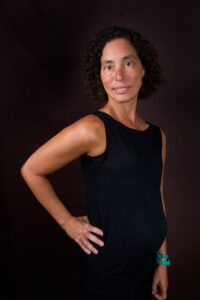by Haviva Ner-David, Kibbutz Hannaton, Israel

WHEN I WAS diagnosed, aside from recommending swimming, the doctor told me and my mother there was an organization I could join called the FSHD Society. They raise money to fund research into the disease, have support networks and regular informational and social conferences. He thought it might be good for me to meet other people with the same disease as mine. I did not agree.
My parents did join. They received the quarterly newsletter, which I tried to ignore. When I did peek at the cover articles, I saw photos of people with crooked smiles like mine, slumped shoulders like mine, but some in wheelchairs, some with walkers, some with symptoms so apparent I had to turn away. I was not ready to see my future. I was not even ready to see my present reality for what it was.
But now, with my own symptoms already impeding my lifestyle, I could no longer avoid my reality. I was going to be in the Boston area anyway for a book talk, and coincidentally or not so coincidentally, the bi-annual FSHD Society Connect Conference was going to be there, too. The forces of the Universe were leading me to my first encounter with others like me. Ready or not, I went.
Walking into that hotel in Boston was how I imagine an African child adopted by white parents into an all-white town would feel getting off the plane in Africa, or even getting off the subway in Harlem. I had never met someone with the disease before, and here I was surrounded by people who looked like me.
These people may not have had the dark curly hair, the slanted brown eyes, or the high cheekbones I had inherited from my parents, but they did have the face with little expression, the eyes that could not completely close, the almost-stagnant lips, the protruding stomach, the hunched shoulders, and the dragging feet (or contraptions to prevent the dragging).
I felt like I had come home to a hotel full of mutants like me. I cried tears of both relief and anxiety. Some of my sister and brother mutants were in wheelchairs, some with walkers, others on scooters. One young woman had a neck brace to hold her head up. Another had her mother constantly at her side, helping her with simple tasks like eating, as she could not lift her arms at all (while I can lift mine to my waist). We were all the same, yet all different.
I spoke to people older than I was and with fewer and lighter symptoms than mine, and I spoke to people much younger, children even, who were already in wheelchairs. I was glad I had come, but I also understood why it had taken me so long. This was not an easy place, even if it was where I needed to be at this point in my life.
Leaving was difficult as well. I was going back to the world of the “normal” people, where no one understood my disease and its effects. I also realized, however, even in a room full of FSHD-ers, no one could understand me completely. They may have understood what it was like not to be able to brush their hair, blow up a balloon, smile a toothy smile, run to catch their fleeing toddler, or lift their toes, but they did not know how it felt to be me.
Coda: My feeling of separation did not disappear with this conference, but the experience did help me realize the answer lay not in gatherings of like-minded or like-bodied people. They were important, and I would continue to attend them and even go on to create an FSHD Society chapter in Israel with my daughter, Hallel, who inherited the disease from me. But that was only part of the work. Only by delving into my unique causes of that acute feeling of separation, would I be able to flow from my narrow stream, slowly but surely, into the vast ocean.
Dreaming Against the Current, by Haviva Ner-David, is available at Amazon, Barnes and Noble, Bookshop, and Book Depository.


Leave a Reply